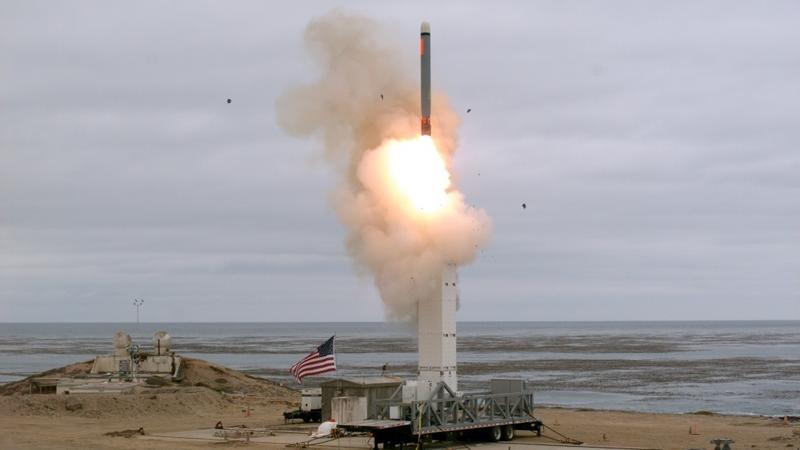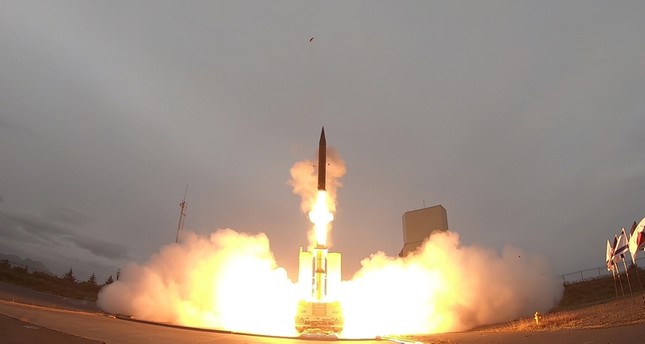
Pentagon Tests Previously Banned Cruise Missile
(August 19, 2019) — On Sunday, the Pentagon tested a conventionally-configured (i.e. non-nuclear) cruise missile at San Nicolas Island, California. The missile flew over 500 km and officials described it as accurately impacting.
A ground-launched cruise missile of that range would’ve been flat out illegal under the Intermediate Nuclear Forces (INF) Treaty of 1987, which the US formally withdrew from on August 2. The Pentagon says they intend for this test, apparently of an old missile they had lying around, is meant to “inform” the future development of missiles that would also violate the INF.
Pentagon Tests Previously Banned Cruise Missile
(August 20, 2019) — The US military conducted a flight test Sunday of a nonnuclear cruise missile that was previously banned under a treaty President Trump withdrew from this month.
“On Sunday, August 18, 2019 at 2:30 p.m. Pacific Daylight Time, the Department of Defense conducted a flight test of a conventionally-configured ground-launched cruise missile at San Nicolas Island, California,” the Pentagon said in a statement Monday.
“The test missile exited its ground mobile launcher and accurately impacted its target after more than 500 kilometers of flight,” the statement added.
The Pentagon will use data and lessons from the test to “inform the Department of Defense’s development of future intermediate-range capabilities,” the statement concluded.
The United States officially exited the 1987 Intermediate-range Nuclear Forces (INF) Treaty on Aug. 2, after initiating the process to withdraw six months before.
The treaty, credited with helping end the Cold War, banned the United States and Russia from having nuclear and conventional ground-launched ballistic and cruise missiles with ranges between 500 and 5,500 kilometers.
US officials since the Obama administration have publicly accused Russia of violating the treaty by fielding a cruise missile dubbed the 9M729.
Moscow has denied violating the treaty, instead blaming the United States for its demise.
Though Trump’s critics generally agree that Russia has been violating the INF Treaty, they fear the US withdrawal will lead to a Cold War-style arms race.
A day after the US withdrawal, Defense Secretary Mark Esper said he hoped to soon base the previously banned missiles in Asia.
“Yes, I would like to,” Esper told reporters traveling with him to Sydney when asked whether he was considering deploying ground-launched, intermediate-range missiles in Asia.
“I would prefer months. I just don’t have the latest state of play on timelines for either a cruise missile or long-range missile … but these things tend to take longer than you expect,” he added.

US Tests First Ground-launched Cruise Missile after INF Treaty Exit
WASHINGTON (August 20, 2019) — The Pentagon said on Monday it tested a conventionally configured ground-launched cruise missile with a range of more than 500 km (310 miles), the first such test since the United States pulled out of the Intermediate-range Nuclear Forces Treaty (INF).
The United States formally withdrew from the landmark 1987 pact with Russia on Aug. 2 after determining that Moscow was violating the treaty, an accusation the Kremlin has denied.
The treaty, negotiated by then-US President Ronald Reagan and Soviet leader Mikhail Gorbachev, banned land-based missiles with a range of between 310 and 3,400 miles (500 to 5,500 km).
In a statement, the Pentagon said the test took place on Sunday at San Nicolas Island, California, and the missile hit its target after more than 500 km of flight.
The test would have been prohibited by the INF treaty.
“The testing by (the) US military of a land-based missile banned under INF treaty two weeks after the official termination of this treaty is a blatant cynicism and mockery of the international community,” the RIA news agency cited Russian lawmaker Frants Klintsevich as saying on Monday.
“We, of course, will do our best in the shortest period of time to ensure that the United States does not have a superiority in these types of weapons,” he said, adding that Russia did not intend to enter into an arms race.
US officials had said for a number of months that they planned to carry out the test in August. The United States plans to test an intermediate-range ballistic missile in November.
Moscow denies flouting the accord and has accused Washington of breaking the pact, allegations rejected by the United States.
The dispute is aggravating the worst US-Russia friction since the Cold War ended in 1991. Some experts believe the treaty’s collapse could undermine other arms control agreements and speed an erosion of the global system designed to block the spread of nuclear arms.
A Pentagon spokesman told Reuters that Sunday’s test used an MK41 launcher, but the system tested was not the same as the Aegis Ashore missile defense system currently operating in Romania and under construction in Poland.
Russia’s Defense Ministry did not reply to a Reuters request for comment sent outside normal working hours.
“Russia had alleged for years that the land-based MK-41 could launch Tomahawks and therefore would violate the treaty,” said Kingston Reif, director for disarmament research at the Arms Control Association advocacy group.
“Even though this is the first test of the combination, Russia will no doubt claim vindication,” Reif said.
US Defense Secretary Mark Esper has said that while he is in favor of placing ground-launched, intermediate-range missiles in Asia, it could be years before such missiles are ready to be deployed.
Additional reporting by Polina Devitt in Moscow. Posted in accordance with Title 17, Section 107, US Code, for noncommercial, educational purposes